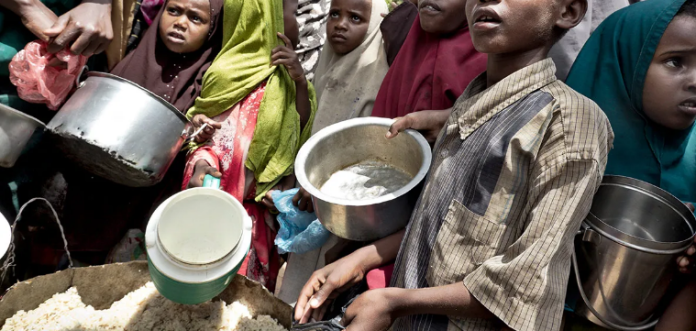The United Nations warns that almost 700,000 children under the age of five are likely to suffer from life-threatening Severe Acute Malnutrition (SAM) in Nigeria’s BAY states this year.
The states are Borno, Adamawa, and Yobe.
According to the global body, the hunger incident is more than double the number of SAM cases in 2022 and four times the number of cases in 2021.
To ameliorate the problem, the UN has allocated $20m from the Central Emergency Response Fund and the Nigeria Humanitarian Fund to urgently ramp up the humanitarian response to the worsening food security and nutrition crisis in northeast Nigeria.
The UN said in support of government efforts, some $9 million in CERF funding and a complementary $11 million NHF allocation will go towards a coordinated multi-sectoral response aimed at preventing deterioration to famine or famine-like conditions.
The agency disclosed this in a press statement on its website on Tuesday.
More than half a million people in the BAY states are also projected to face emergency levels of food insecurity — one step away from famine, from June to August which is the peak of the lean season, according to the March 2023 Cadre Harmonisé analysis.
The lean season also coincides with the rainy season, when the incidence of acute watery diarrhoea, cholera, malaria, and other diseases increases, aggravating the precarious situation of malnourished children.
“Extremely high rates of acute malnutrition and deaths are predicted unless there is a rapid and significant scale-up of humanitarian assistance,” warned the Humanitarian Coordinator for Nigeria, Matthias Schmale, “Government, donors, and the international community must make urgent funding available to protect the lives and future of vulnerable children in north-east Nigeria.”
The statement noted that the bulk of the CERF allocation, $6 million, will go to the World Food Programme for food security interventions (including food and voucher assistance) for 95,000 extremely food-insecure people in three garrison towns of Borno State.
“Some $2 million will go to the UN Children’s Fund for the prevention and treatment of acute malnutrition (including providing ready-to-eat therapeutic food and Tom Brown solutions (a nutrient-rich locally produced supplementary food). And $1 million will go to the Food and Agriculture Organization for seeds, tools, and other agricultural livelihood support to boost local production of nutritious foods to build resilience.
“Most of the NHF funding ($11 million) will go towards improving access to clean water and sanitation hygiene, and nutrition (including reactivating, sustaining, and scaling up the bed capacity at stabilization centres and scaling up outpatient therapeutic feeding programmes). The rest of the funding will go to healthcare (including the integrated management of childhood illnesses and complicated SAM cases), and to protection services with a focus on gender-based violence, child protection, and mine action. The NHF aims to allocate 50 per cent of funding to eligible national partners on the frontlines.
“The alarming food security and nutrition crisis is primarily the result of years of protracted conflict and insecurity which continue to prevent many people from growing the food they need or earning an income to procure food,” it added.


